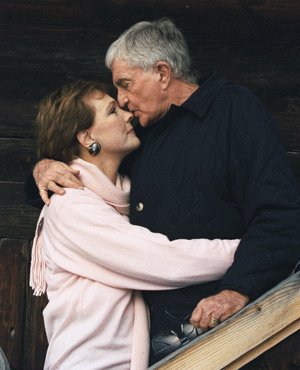
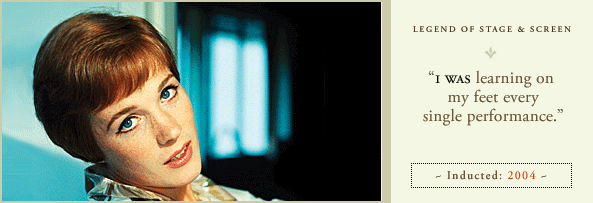
June 10, 2004
Chicago, Illinois
Could you tell us about Walton-on-Thames? What was that like when you were growing up?
Julie Andrews: Walton-on-Thames, Surrey, which is where I was born, is about 20 miles south-southwest of London, and when I was very young it was just a country stop on the railway line and it is now part of Greater London and very much suburbia. And I know the ins and outs of it, but there are very few places that you recognize in terms of the way it used to be. But, it's a very sweet place. It's sort of the middle village between a very up-market village and a very low, poverty village, at least in the early days.
What did your parents do?
Julie Andrews: My real father was a school teacher. He taught practical crafts and English and Math.
My mother remarried when I was about four or five years old, so I then went to live with my mum and stepfather, and he was a fine tenor, he had a singing voice. He was from Canada, from Toronto. He joined forces in more ways than one with my mother in that she was a really wonderful pianist and probably should have been a performing concert pianist but, in fact, due to circumstances and the war and tremendous poverty and things like that, they became part of a vaudeville act. And consequently, I knew nothing else but that, and to their amazement, I think, they discovered when I was about eight years old -- my stepfather, I think in an attempt to become a little closer to me, decided to give me some singing lessons because my school had closed down because of the escalation of the war. And, I think he thought it would just sort of "keep me quiet," so to speak. And, they discovered that I had this four-octave soprano voice, which surprised them since it was my stepfather who sang, not my real dad at all. And so, I knew nothing but vaudeville -- music hall -- gradually began to appear with my mum and my stepdad and tour the halls, and made a fairly important, for me, debut when I was about 12 years old.
Before we get to the debut, is it true that you made an appearance on stage at age two?
Julie Andrews Interview Photo
Julie Andrews: You've done your homework! Yes, my mother was the pianist. My aunt was a dancer and they were two extraordinary ladies. I'd love to write about them one day. My aunt founded a dancing school, which she ran for almost 50 years in Walton-on-Thames. She would put on her local shows and that was when I think I made my real first debut. I think I was either Winken, Blinken or Nod, one of the three.
No speaking role?
Julie Andrews: No speaking role but probably a lot of bouncing about in a baby suit of some kind.
So really there was never a time that you weren't on stage?
Julie Andrews: Not really. I enjoyed it immensely.
You mentioned that the schools had shut down during the war. Does that mean there was really no school to go to?
Julie Andrews: Yes. There was a lot of evacuation going on at that time. All the children were being evacuated into the country. I was, too, for a while. The air raids towards the end of the war particularly were coming so fast and furiously -- with the doodlebugs (buzz bombs) as we called them -- that no housewife could get anything done and everything just ground to a halt for a while.
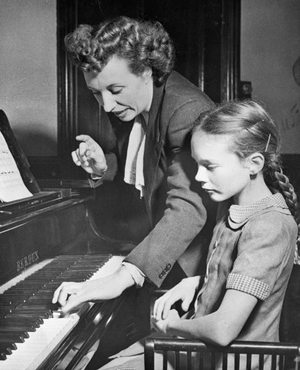
And then, were you eight when you met another voice teacher?
Julie Andrews: Yes.
My stepfather was very smart, in that he knew he didn't have the ability to teach, and because it was such a very young voice, but such a sort of oddly powerful one, he knew that he had to put me in good hands if he could. And so, he took me to his teacher who was a very fine dramatic soprano, an English dramatic soprano. She'd done a lot of Handel. I can't even think of the right word at this point. But, she was a very gentle woman and I was with her for most of my early life. Only when I went to Broadway did I kind of not work with her, and of course I prepared with her to go to Broadway, but she didn't actually come with me. But, the foundation that she gave me and the technique -- the technical foundation -- was terrific.
What was her name? Did she have anything to do with the diction that you're famous for?
Julie Andrews: Her name was Lillian Stiles-Allen and she had an extraordinary voice. A voice much like Kirsten Flagstad or Birgit Nilsson, that wonderful kind of fluted sound that comes out of those extraordinary dramatic sopranos. She firmly believed -- and taught me -- that your voice would hold up for you if you were true to your words. She said there could be people in the audience that needed to see what you were saying, because maybe they were hearing impaired in some way. But more than anything, she said if you relied on those words the voice would come through for you. In other words, be true to your vowels, be true to the consonants that were strong, and not in a kind of glottal way but just really use them as stepping stones to a good foundation for a voice. She was absolutely right.
What else did she teach you?
Julie Andrews: I sang in those days a lot of sort of opera and operetta. I felt that I knew, and I believe that I was right, that I really didn't have the voice for it. My own voice was very white, very, very thin, and I was able to do these incredible sort of gymnastics with it, tremendous sort of calisthenics, but in a coloratura way, and it was so high that dogs for miles around would howl when I took some of the high notes on. But, she gave me the groundwork of opera and she always said, "Go beyond your reach. If you're doing something light, practice something even more difficult. Practice it a tone up so that when the night comes and you have to sing it, it is so within your range." And for many, many years I did that.
That's sounds like a baseball player who practices batting with two bats so when he's holding one it's very light.
Julie Andrews: Exactly. Yes, very similar.
You mentioned that at 12 you had an important stage debut. That was a very successful show, wasn't it?
Julie Andrews: Well,
it was a sophisticated London revue and it was at a theater which is no longer there. It was called the London Hippodrome, and it's now just a sort of nightclub in Lester Square, London. But, it was a very beautiful theater and I was literally the smallest person on the bill. And because it was so sophisticated, the producers thought perhaps it wasn't right that I would be singing in this show and the night before we opened they decided that they couldn't use me. And, of course, my mom being somewhat of a stage mum, sort of said, "No, you can't do this to this child. It's her great debut," and so on. And so, she and my stepfather and their agent descended on the poor producer and they said, "She'll sing a much more difficult song and you'll see." And so, I auditioned for a much more difficult song and the end result was that I was in the show, stayed in the show, and on opening night the audience went crazy, and it was a complete standing ovation. The first thing I had ever really done. The first time I had ever really tried anything that important. And, the press followed me home. You know, the kind of thing when you're a young fluke in a way, and that was the beginning of a very busy few years right through my teens of touring and radio and early, early television and so on.
What was the name of that show?
Julie Andrews: The name of the show at the London Hippodrome was Starlight Roof. And it starred English performers: Vic Oliver, Fred Emney, Pat Kirkwood, all very talented. Patricia Kirkwood was a very glorious looking lady with wonderful long legs. She was the leading lady in every sense.
At this point were you still close to your real father?
Julie Andrews: Oh, yes.
What did he teach you?
Julie Andrews: My dad was a very special human being. He had an innate decency. It didn't come from...he was very bright. He was a nature-loving man. He treated all of us in the family -- including his first wife's other children -- he treated us all the same, and as beloved equals. And, we knew he was special. I mean, obviously any dad to a young girl is special if he does all the right things, and my dad certainly did, but he's the one that instilled in me any true reality in my life because on the one side I had this mad upbringing of vaudeville and touring a great deal and very little schooling. My father was the one that took me on nature walks, took me to the swimming baths, taught me how to swim, took me down to the seaside in freezing cold weather and we dipped in the sea. We climbed the local hills, and he gave me a love of books.
What books did he introduce you to?
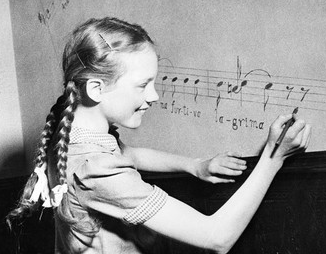
Julie Andrews: When I went to see him he would read to me and he would pick what he thought would be appropriate. Alice in Wonderland and things like that when I was a child. He would buy books for me. I didn't see him all that much, strangely enough. Occasionally, for a two-week period in the summer holiday maybe, or a visit over Christmas. Or he'd come for a weekend and take me and we'd get on our bicycles and ride for 15 miles to get to his place. But what he did give me was always exactly right. Just the memory of him sitting and reading to me was enough to make me love listening to books and the spoken and written word.
Other than Alice in Wonderland, are there any books that you truly remember loving as a kid?
Julie Andrews: There was a book that he gave me. It's interesting that you ask that. Obviously Wind in the Willows, and all the classic children's books, but there was a little book that we found and he leafed through it, and he said, "Here you are, darling. I think you'll like this." And, it was a very small children's novel called The Little Grey Men, by an English author called "B.B." And it was a very simple nature tale of the last four gnomes left on this earth in England. Very much like Watership Down, that kind of big nature study, and it was set in four seasons. It was a terrific adventure story. I swallowed it up and it went out of print. And, I subsequently have started my own imprint at Harper Collins and it's coming out this fall. I'm bringing it back again and I'm absolutely delighted about it. It's one of our mission statements is to bring back books that are worthy of a revisitation in a way, and this is the first one. And, I write about it as a little chapter before it begins.
You've become an author yourself, so that must be the influence of your dad.
Julie Andrews: That book probably influenced me as much as anything, that and my dad. Yes, absolutely. And obviously Dickens and Goldsmith and oh gosh, so many. Jane Austen obviously and the Brontë sisters and so on.
I also loved to scribble as a kid. I loved to write and eventually, because I didn't have a formal education, a governess was found for me who traveled with me wherever I went, because touring in vaudeville you're a week in one place, a week in another, and you could not settle into any school. So, I had this wonderful lady who traveled with me who quickly recognized that if she wanted me to do anything, all she had to do was say, "Do this first and then you may write your story," whatever story I was going to write because that was obviously what I loved to do most of all. She was a very gentle, very kind lady, and I loved her.
What was her name?
Julie Andrews: Her name was Gladys Knight.
She didn't go on to become a famous soul singer?
Julie Andrews: No, not that one!
It's interesting that you had a governess and famously played governesses. Mary Poppins and Maria von Trapp. You knew what it was like to be a governess.
Julie Andrews: She wasn't that kind of a governess. She was a lot older. Sort of a retired teacher who then became a private tutor. Nevertheless, I guess I must have picked up a few things from her, yes.
Did you ever miss having a normal education and a normal childhood?
Julie Andrews: Yes, I did. I was too foolish in my teens and too busy to fight for it. My mother said, "I think we'll probably quit school, you're going to get a much bigger education out there," and indeed I did, of a sort, but especially as I got older, I really regretted not having a college education. I would have loved that.
There's also the socialization value of being with other kids.
Julie Andrews: Yes. I'm not complaining about it.
I have retained some very close friends from my home village, but actually I didn't have many peers, not young friends in those days. It was all mostly adults because of the touring, because of the vaudeville. But, the kind of education I was getting was that strange one of standing in the wings and watching phenomenal performers performing every week, every night, watching everything from comedians, to jugglers, to animal acts and different kinds of comedians and dancers, and it was extraordinary. I didn't think I was getting an education at the time. It's only in retrospect that I realize that that stood me in very good stead in my later years.
You also made a television debut in your teens too, didn't you? Wasn't there a show with Stanley Holloway in 1949?
Julie Andrews Interview Photo
Julie Andrews: On TV or radio? That's a very good question. The Stanley Holloway one I don't remember, not until My Fair Lady, when we worked together on Broadway. But I did quite a lot of radio shows, and I did do some very early TV shows but I can't actually remember specifically what they were.
It was very early for the history of television as well.
Julie Andrews: It was.
Is it true that you supported your parents financially for a while after they retired?
Julie Andrews: Yes, I did. We all came from such humble beginnings. It's amazing. It has always staggered me. I wish I could write about it one day. I'd like to try.
My mother made such a quantum leap from her extremely humble beginnings to being considered -- certainly in our local village -- fairly big-time for being on radio and touring as she did, and playing the piano so beautifully. And then the next leap that I made, and in like three generations. It's hard to imagine that it's possible, but it was because my mother really came from -- her mother was just a "below-stairs" maid at the local big mansion, and I don't think in her lifetime saw any wealth of any kind, and worked continuously and hard. Her father was a manager of one of the coal mines up in the north of England and he was a pit manager, albeit a talented man, somewhat of a poet and a musician. He played the piano very well also and taught my mother to play in the early years.
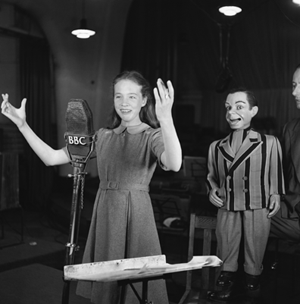
Were there any singers?
Julie Andrews: No, that's the extraordinary thing. I do not know where that came from, but I'm very glad it did.
We all are.
Julie Andrews: Yes, thank you.
Could you tell us about how you came to be cast in The Boy Friend and the impact that had on your career? You were performing in the pantomime Cinderella, weren't you?
Julie Andrews Interview Photo
Julie Andrews: Yes. By now I had toured England, endlessly, and I had done a lot of Christmas shows, which in England are called pantomimes. I'm not sure how many Americans are aware of English pantomime. It's a rip-roaring Christmas festival, usually based on one of the great fairy stories, like Cinderella, Jack in the Beanstalk, Red Riding Hood, all the great fairy stories. They throw in music and slapstick and every year they are reworked and revamped to accommodate whatever talent is brought into that particular show.
I had sort of gone as far as I could go and was playing in a very beautiful production of Cinderella at the London Palladium. That was it in those days. That was about as far as one could go, because although Noel Coward and Gertrude Lawrence, and people like that had gone on to write and to perform in many things, other than another man called Ivor Novello, there wasn't a lot going on in England in my teens. And suddenly...
I was recommended by a very kind woman called Hattie Jakes, who appeared in one of my radio series -- recommended that the director of The Boy Friend come and see me in Cinderella. The Boy Friend was a hugely popular English show that had been running in London for about a year. It was sort of a little, light, frothy musical, a sort of pastiche of the 1920s. And they were going to take it to Broadway with a brand new company. They weren't going to touch the original English company because they were doing too well and still selling to packed houses. So, the director of the English Boy Friend came to see me and subsequently brought the American producer, and I was asked if I would like to come to Broadway to be in The Boy Friend.
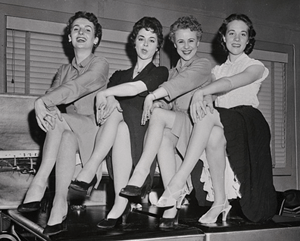
This was Cy Feuer?
Julie Andrews: Cy Feuer, yes. And Ernie Martin was his partner.
Did they already have big names on the stage?
Julie Andrews: Oh yes, they did. They had done Guys and Dolls. They did Can-Can and Silk Stockings.
So this was a huge break for you?
Julie Andrews: It was a huge break. I didn't truly recognize how big it was. I was more terrified at leaving my family. I had an awful separation anxiety about leaving home, because I always was leaving home and rushing back -- if I could -- weekends. And they were offering me a two-year contract at an incredibly small salary. There were a great many other English performers going as well, because other than one or two Americans it was an English company. All the company should have had English accents, and so it was necessary that they be English.
How old were you?
Julie Andrews: I was 18. I was 19 the day after we opened on Broadway. And, it's the first time I had ever really been away from my family for that potential length of time, and suddenly I got so panicked about it, and I called my dad, my real dad. And, I said, "Oh god, daddy, they're asking me to go for two years. What should I do? I don't think I can be away from the family for that long." And he said, "Well chick, it could run two weeks or two months. It might not be two years, and it would open up your head to such an extent, I think you should do it." I asked him later in life whether that was a hard thing to do and he said it was one of the hardest things, to say, "Go," to just throw me into the bigger pond, so to speak, and hope that I would swim. And of course, because dad said it, oh, he said a wonderful thing. When I said, "But how will I know what to do?" he said, "Your own good brain will tell you what to do when the time comes," which was hugely flattering and kind of implied that he thought I could cope. So, I took my courage in both hands and said, "I would like to accept this contract but I will not go for longer than one year." And lo and behold, Messrs, Feuer and Martin said, "Fine." And, I was the only one of the company that had a one-year contract, so off I went to Broadway for a year of incredible learning and education.
Doing The Boy Friend on Broadway led to other things of course. Is that what really made your name here in the U.S. too?
Julie Andrews: My life has been so fortunate. I have had most extraordinary good fortune in my life. I sort of put it into three categories, the three major stepping stones. One being that opening night when I was 12, when it started my career. The second being going to Broadway. And the third going to Hollywood. Each one of those happened under the most extraordinary circumstances.
What happened with The Boy Friend was that because I said I would only do it for one year, just before I was going to leave to go back to my family in England -- and The Boy Friend was a huge success, and it did sort of begin to help my career tremendously, I mean I think people on Broadway certainly began to know my name a little bit -- but I got a call about two weeks before I was due to leave. And, it was a man who said, "I'm the manager of two writers called Lerner and Loewe, who are doing a new musical of Bernard Shaw's Pygmalion, and could you just answer me one question? How much longer are you in The Boy Friend?" And I said, "Oh, I'm going home in two weeks." And, he said, "Oh my! I was convinced, as was everybody else, that you had a two-year contract and I said to the guys, 'Well, let me make a phone call. It'll only cost a dime.' " And because I only signed for one year, I was able to audition for My Fair Lady, and by the most extraordinary good fortune I was able to do My Fair Lady, and that's really when I think my life just took off in all directions.
Where and when did My Fair Lady open?
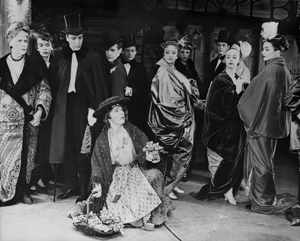
Julie Andrews: Well, it opened out of town in New Haven on a stormy winter's night. Great drama. Then it opened in 1956 at the Mark Hellinger Theater in New York City on Broadway.
There were people that thought it was a folly to tamper with George Bernard Shaw's work. Did you hear that?
Julie Andrews: I was a little curious about it myself, but I only had to hear the songs to know that Alan Jay Lerner had really done Shaw justice. I believe to this day that these songs just took off where the text of the play finished. And he was a giant. Both Lerner and Loewe, and particularly Moss Hart, who was the director of My Fair Lady. They were giants, and I was lucky enough to be led by gentle giants in every respect in those days.
How old were you? 20?
Julie Andrews: Yes, I was. I was 21 not too long after My Fair Lady opened, yes.
When you first looked at that script for your audition, did you know this was something extraordinary?
Julie Andrews: No. Actually what happened was...
I sang for Lerner and Loewe first and belted out my audition song and a couple of others, and then went in to start reading from the original Pygmalion because the script wasn't quite finished. And, I knew that I was hopelessly out of my depth. You have to remember I was raised in vaudeville. I wasn't even on the right side of the tracks. I wasn't in legit theater at all. I had never done a play other than this very, very light piece called The Boy Friend. And so, I really knew from nothing. And, I knew that I understood Eliza in some way but I was hugely shy, hugely insecure and I wondered if anybody would know that there was something inside that they could use if they knew how to get it out for me.
What was your audition like?
Julie Andrews: Pretty awful, I would imagine. There I was, singing something like -- if memory serves -- it was something like the waltz song from Tom Jones or something, an excruciatingly high big note, which I belted out as loudly as I could, and a lot of coloratura. But I guess they figured I had the voice for it, now if only I could act. And that's what Moss Hart gave me.
It was extremely daring for them to take a risk that you could act and that Rex Harrison could get by without singing.
Julie Andrews: Rex, I think, they were much more sure about. He couldn't sing, but he had an innate musicality which enabled him to kind of do a sing-speak sound, which was great and exactly right because it blended straight out of dialogue into song.
I think that probably Moss, of all people -- I've read Moss's wonderful biography, Act One, and if you read that you have to say what a generous sweet man he was. He came from extremely humble beginnings himself. And I think any other producer would have sent me home. I had a feeling that if I didn't cut it that weekend that I probably would have been on a plane back to London. But Moss was a very kind man and covered it by wit and sophistication, and all of the things that he'd acquired. But basically, I think, he must have sensed and identified with my early pain and fear because he'd had it, too. And, he was kind. It's as simple as that. He wanted to, and maybe he was perceptive enough to see -- maybe I didn't know, but there was something that they felt was there and I certainly didn't -- but he certainly seemed to feel that it was there.
He sounds like a great man.
Julie Andrews: Lovely man, and I credit him with all that I am today, because had it not been for Moss I probably would have gone back to England.
I was absolutely atrocious at all the early readings and poor Rex Harrison wondered what on earth he had been landed with, this young girl that could sing and had not a clue how to get into the arc of a character. I had no idea how to develop a character at all. He intimidated me tremendously because he was so, so good. He was also very, very nervous and very, very demanding and selfish because he was scared to death because he had never sung before. So, I knew I could pull off all the singing stuff and he, for sure, knew he could pull off all the dialogue, but he wasn't about to give anybody else any time and I know that Stanley Holloway, who played Doolittle, also had problems and was waiting for his sort of fleshing out of the character. And, Moss took me for a long weekend and dismissed the entire company and worked with me in the most brilliant way.
What did Moss Hart get you to do in that weekend that you hadn't been doing?
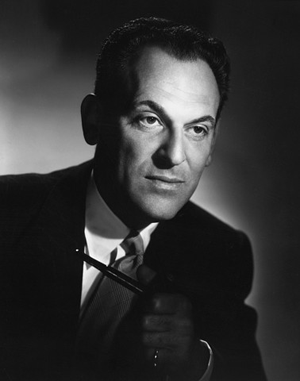
Julie Andrews: Moss Hart really just helped me find Eliza and he demonstrated. He said, "No, no, no, you're acting like a school girl," or "That's better, that's better," you know. It's hard to say what he did. He created pictures in my head. He helped me understand some of Eliza's dilemma.
I don't know which was the hardest part, the first half or the second half because they were both very hard. I was struggling with the Cockney accent. I'm not great at accents, believe it or not. Even though I have a good ear for things, I don't have a great ear for accents. But I was struggling with that, too. He just helped me see what courage this young lady had. Eliza Doolittle that is.
We rehearsed on the roof of the New Amsterdam Theater, which in those days was the scruffiest, dirtiest place. That's the theater where all the Ziegfeld Follies had been, and there was this great nightclub up above that had gone into terrible disrepair. Anyway, I knew going down to the New Amsterdam that I was in for an awful time.
It was a little bit like going to the dentist. You knew it was going to be very painful, but if you could stick it out, maybe with luck you'd come out feeling a heck of a lot better. And, that's what Moss [Hart] did for me. It was painful. And, he said, "We have no time for embarrassment. We have no time for anything but the blunt truth." And, he shaped, pushed, cajoled, wheedled, loved me, yelled at me, just helped me become Eliza Doolittle. And although by the following Monday, I'm sure I retreated 50 percent, I had gained 50 percent and it gave me the foundation from which to really start working on the role. And, I played My Fair Lady for three-and-a-half years. And, Alan Lerner once said that he felt that a long run in a very good role was more help to a performer than doing repertory with lots and lots of short roles. You might become very facile, but what I did was learn what did get a laugh, what didn't get a laugh, and why I didn't get it if I didn't get it. What the difference was in terms of it raining outside or snowing or an audience that was coughing their hearts out or one that was too hot in the seasons, when your leading man has a headache or when you have a voice that's hanging on by a thread. I think I learned in My Fair Lady everything that set me up in later years in good stead because I really learned how to preserve and take care of myself and I was learning on my feet every single performance.
It played havoc with me physically because three-and-a-half years is a very long time. It was like a long tunnel. I did get a break between England and America, but it wasn't that long.
What a discipline!
Julie Andrews Interview Photo
Julie Andrews: It was a discipline. And when I finished it was like, "Well now, what to do with my life? I have no life." Because it is in a way like becoming a nun or just disappearing into this long tunnel. Wednesdays always seemed very black to me. Black Wednesday was the day that you had two shows and got up feeling awful on Thursday and had to pull yourself up only to be slammed back into the Saturday matinee again, because they were exhausting. It is one of the hardest roles, My Fair Lady. I don't think I know any of the Eliza Doolittles that truly survived vocally or physically. It took its toll on all of them.
It's hard to find an actress that can look the part and sing, and act this transformation Eliza goes through.
Julie Andrews: And also that can sustain the yelling and screaming and the Cockney accent, and the rage that comes in the first two or three songs, and then pure, pure singing in things like "I Could Have Danced All Night." Plus the big dramatic role, too, as you say.
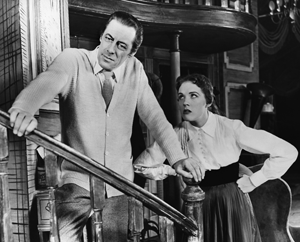
It's a great role.
Julie Andrews: It is probably one of the best roles for a lady in musical theater. That and perhaps Gypsy. There's a few others. Sweeney Todd is pretty heavy, I would imagine, for all the principals.
But Eliza evolves so dramatically.
Julie Andrews: It's the best Cinderella story really, yes.
You got married after doing My Fair Lady in London. How did you meet your first husband?
Julie Andrews: I met my first husband, Tony Walton, long before I became anybody. I had just made that first debut at 12 years old, and he was 13 at the time, and he came to see me in one of those English pantomimes at Christmas. It was the first pantomime I ever did, and I played the egg in Humpty Dumpty, and he was sitting there in the front row. And lo and behold, got on the train going home and got off at the same station and said, "You're from Walton? I'm from Walton." And Tony Walton, which is his name, is not linked with the town but it just happened to be similar. And, he said, "Where do you live?" And I thought, "Oh, I will be very clever." And I said, "Oh, the other side of the bridge." So he then went and looked up all the Andrews that lived the other side of the bridge in this area and, lo and behold, about two days later there was a knock on my door and he arrived with his brothers and we became firm friends, and eventually Tony and I married. We have a beautiful daughter by that marriage called Emma.
You were passed over for the film of My Fair Lady, and then made a fantastic screen debut in Mary Poppins. How did that all come about?
Julie Andrews: Again, the good fortune in my life suddenly came along. After My Fair Lady I was very lucky to do Camelot for Lerner and Loewe with the wondrous Richard Burton. By now I was married to Tony and I did know my way around Broadway, and I knew a little bit more about performing, and everybody trusted me and I wasn't quite so desperately shy.
My Fair Lady was bought by Jack Warner to be made into a movie. I didn't think I'd get it. Alan Jay Lerner and Moss Hart, I believe, hoped that I would. Rex [Harrison] certainly was going to make it. But, I understood very well when they cast Audrey Hepburn in the role because, although by then I was a fairly big name in the small pond that is Broadway, I certainly wasn't known across America, and I certainly had never made a movie. So I didn't get the role of My Fair Lady in the film and, lo and behold, I was in Camelot and Walt Disney came to see Camelot. He was advised to see it because he was putting together this movie of Mary Poppins. He came backstage afterwards. I thought he was just going to visit. And, he said would I like to come to Broadway -- sorry, to Hollywood. I was on Broadway. Would I like to come to Hollywood to see the drawings, the designs, the art, hear the songs and the lyrics for this musical of an English book, Mary Poppins, that he was doing.
And he turned to Tony Walton and said, "And what do you do, young man?" Tony was, and is, a designer of theater and film. A wonderful designer of sets and costumes, but he had done very, very little at that time and he explained this to Walt. And Walt said, "Well, then you better bring your portfolio with you when you both come." Oh, and I was just a teeny pregnant, like about two to three months pregnant. And I said, "But I'm going to have a baby, Mr. Disney." He said, "It's okay. We'll wait." And so...
Tony and I went to Hollywood and Walt showed us everything to do with Mary Poppins and also wined and dined us so sumptuously and so wonderfully. And, it was such an easy thing to do to say, "Yes, thank you, Mr. Disney. I would love to do that movie," because everything seemed to come full circle, because all the stuff in Poppins had that rum-ti-tum quality of being vaudeville. And all of a sudden I thought, "Right, I'm home because this I can embrace and perhaps bring something to." And again, in the kindest hands possible, I was taught how to make a movie and that was the beginning of that. How lucky can anybody get losing out on My Fair Lady and three months later being asked to do Mary Poppins?
To this day a lot of your fans are upset that you weren't in that movie, but it sounds like you made your peace with it.
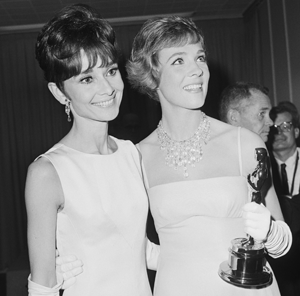
Julie Andrews: I did make my peace with it. That isn't to say that years later I didn't wish that somewhere, somehow I had put down My Fair Lady definitively, just so that my children or my grandchildren could see it. But in the great scheme of things I ain't complaining one bit.
What was it like winning the Oscar?
Julie Andrews: I honestly didn't think I would. I really thought Anne Bancroft was going to get it that year for The Pumpkin Eater. She was superb in that movie. And Poppins was my first film. I never dreamed I would get it. Actually, when I did get that Oscar I really felt that it was more because I had missed out on My Fair Lady, that Hollywood was (a) saying welcome and (b) saying how sorry they were that I didn't get it. In the speech that I gave I said, "I always knew Americans were generous but this is absolutely ridiculous," and I really felt that it was generosity and their saying, "Welcome, welcome."
Your movie The Sound of Music has become a classic. Was it clear to you that this was going to be a great piece of work when you first encountered it?
Julie Andrews: When I was first asked if I would like to do Sound of Music, I was very thrilled to be asked and very glad that I was going to do the movie, but was a little careful about certain aspects of it because it was tremendously saccharine, on Broadway particularly, and it seemed to me that if we weren't careful with the real scenery and with everything else that was going into it, it could be horribly sugary. And, I certainly made every effort to make it more astringent and the great Christopher Plummer contributed so much in that respect. It was his performance that was the glue, the vinegar that held the film together. And, then Robert Wise, who was again an adorable man, our director, and he taught me a great deal about filmmaking because Mary Poppins was the first film I ever made, and then I made one called The Americanization of Emily, but by the time I got to Sound of Music I was probably getting full of a lot of little tricks and things that I didn't know I was doing, and Bob said, "Don't do that. Don't do that. Do that." And, I really learned a little bit more about filmmaking at that time.
it was an indelible performance. How did you meet your second husband, Blake Edwards?
Julie Andrews: I met Blake in 1967. We both laugh at this. I passed his car and he passed mine on the middle island of Sunset Boulevard on Roxbury Drive. I thought, "That's a very interesting looking gentleman," and I presumed he must have thought the same about me in terms of being an interesting looking lady. And lo and behold, a couple of days later it happened again and again. And finally, we were waiting for the traffic to clear on either side of this intersection and he rolled down his window, and I cannot remember which one of us said it but it was sort of, "Are you going to where I just came from?" And we both realized that, being on Roxbury Drive, we had probably both been to see, or were going to see, an analyst. And one of us nodded. I don't know which one asked the question. And not too long after, I received a phone call asking if he could talk to me about a film, which was a film that we both did together called Darling Lili. It was a huge flop and it was great fun to make, and shortly after Darling Lili we were married.
We're very interested in how people recover from career setbacks and failures like the one you mentioned. You must have been very well grounded, because there were a couple of failed movies in this period, but you kept going.
Julie Andrews: I think it's that early training, if anything, in vaudeville for me that gave me any kind of gumption. Touring endlessly around England, doing the second show on a Saturday night in places like Glasgow or Newcastle or Liverpool or Swansea or Cardiff, that's pretty dicey. I was very, very young. There were days when they would have to turn all the house lights on in the theater because people were hurling beer bottles and things like that. And, there was this determination to get through. My mum was terrific. She would say, "Don't you dare complain. Don't you dare say you can't sing in cigarette smoke," because in those days you could see it spiraling down the great arcs on to the spotlights on to the stage. Nothing but cigarette smoke in those days. And she would say, "Don't you dare get a swollen head," accompanied by great love sometimes. But, all the good stuff that one needs, "Get up and do it. What are you complaining about? You're so much luckier than most other people," just absolutely true.
So you never lost hope when some of those movies didn't do so well?
Julie Andrews: You never set out to make a bad movie. You always hope that you're making a good one. We're sad about them, inasmuch as they damage the career. In those days it was important, but not as important as it is today, to keep making success after success after success. It's terrifying today. You can maybe have one so-so movie but you've got to come back with another that's huge, if possible, and that must be very, very difficult for young talent.
You and your husband, Blake Edwards, enjoyed a great success with Victor Victoria in the 1980s.
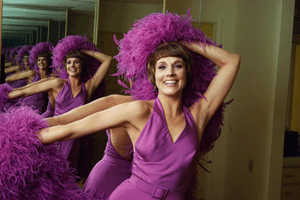
Julie Andrews: Yes, particularly in all the great cities. Particularly in Chicago and New York, L.A., San Francisco, all the really sophisticated cities. I'm not sure if it was in the middle west. It's theme was provocative, but actually the underpinning of the theme was about love and being happy with who you are. I had a wonderful time making the film. It was Blake, my lovely Blake, at the peak of his creative talent, and I knew I was in the safest hands possible.
Actually it's a little daunting to be married to your director because quite often he'll assume that I know what he wants when I'm simply begging for some small morsel that will get me through. But he'd say, "Oh, that's fine. Just keep doing it." But we could talk about it, and we did when we needed to, but actually we'd mostly not talk about it when we went home. We had too many kids. We pooled all our children. He had two. I had my lovely Emma and we subsequently adopted two.
At this point you've stopped singing because of a surgery that went awry and it's a loss to all of us. Is there any chance of your singing again in the future?
Julie Andrews: I remain optimistic but not tremendously so. If I am able to sing again it will be through some miracle operation. There's a lot of work being done to help singers regain their voices, but in my case I actually lost vocal tissue so it's very hard for my chords to rub together and I need to replace that tissue. I do have some notes in my voice.
I certainly won't be able to sing the way I used to, but probably at this vast age that I have now arrived at I couldn't sing those songs anyway. And, that amazing thing of finding new directions at this time in my life when I never expected to, it was a setback. It was devastating. I miss the music unbelievably, but here am I with a publishing imprint, doing lectures, doing a lot of movies that don't require singing, still working as hard as ever. In fact, I think I may be even more at work than I used to be, and I simply love it. I couldn't be happier.
You directed a new production of The Boy Friend recently.
Julie Andrews: I directed my Emma, Tony's and my daughter, with her husband and her partner, Sybil Burton, Sybil Burton Christopher, in a wonderful little not-for-profit theater in Long Island, and it's a great theater and I directed there for them and had a ball. And, of course, it was The Boy Friend in which I had begun on Broadway and felt I might be able to contribute something to it and was stunned at the talent that I found and how easy and lovely it felt and Tony Walton did the sets and costumes for it. I was in Emma's theater and when I said to Emma, "Emma, if I fail for the family, for you, what if it's not a success? What if it..." She said, "Mom, what better place to try than our theater? You're in the safest possible hands and we'll surround you with people who know what they're doing so that you just do what you do best." And all of a sudden it turned out to be this wonderful success.
Would you do it again?
Julie Andrews: Oh, as they say, "In a New York minute!" Yes.
So one door closes, another door opens.
Julie Andrews: Exactly. To be really slightly corny about it, as Maria von Trapp says, "When God closes a door, somewhere he opens a window." And this window has just been busted wide open and I'm so busy.
You've spoken several times today about the importance of family, staying close.
Julie Andrews Interview Photo
Julie Andrews: Yes. I think family matters to me enormously. In fact, family is the first priority. If my family is good, I can do anything. If they're not, I'm a basket case. There's a lot of guilt associated with going out and doing a concert or speeches or whatever. In a way I'm kind of glad, now that I'm turning to the writing of children's books because it allows me to stay home. I know all the family has grown up and they're all functioning in their own way and in their lives. There are grandchildren now, and I still have Blake to go home to and he has been very patient with me.
It's an enduring marriage by Hollywood standards.
Julie Andrews: It's 35 years this year and that is enduring, yes.
One last question we like to ask of our honorees. What is your conception of the American Dream? Does it mean something to you personally?
Julie Andrews: It is America that gave me so much in my life. It wasn't until I came to America that my life just exploded in so many ways. So for me, I think in a way, though I'm English, I've been living the American Dream and I'm eternally grateful to Americans for allowing me to do what I love doing the most. And, I feel an enormous responsibility to bridge the gap between England and America, and be a sort of very quiet ambassador for my country to try to sort of do a "hands across the water" thing where they understand England and English people understand Americans. I adore America.
Your performance as the Queen in the Princess Diaries has brought you a whole new audience, a whole new generation.
Julie Andrews: I know. It's phenomenal. There's a whole new generation out there that says, "Do you remember Mary Poppins?" "Yeah." "The Sound of Music?" "Yeah." "Princess Diaries?" "Oh, cool!" And I just love it.
It's been wonderful.
Julie Andrews: I thought that might be a good ending.
Thank you so much for taking the time to speak with us today.
